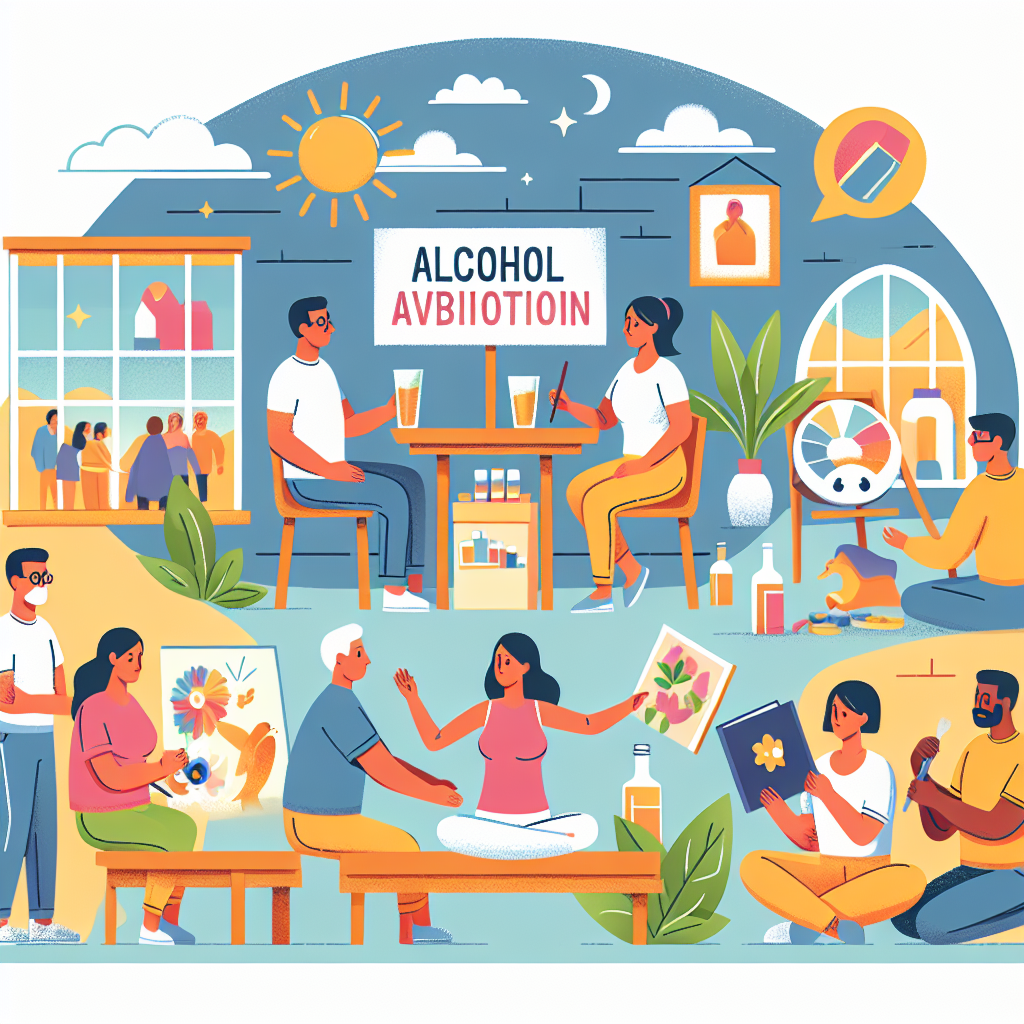-
Table of Contents

“Empower Recovery: Support, Love, and Rebuild Together.”
Introduction
Rebuilding a life after alcohol addiction is a challenging yet rewarding journey that requires patience, understanding, and unwavering support. As a loved one, your role is crucial in providing the emotional, physical, and psychological assistance needed to navigate this path. By fostering a supportive environment, encouraging healthy habits, and promoting professional help, you can significantly contribute to their recovery process. This guide will explore various strategies and practical steps you can take to help your loved one regain control of their life and achieve lasting sobriety.
Effective Strategies for Supporting a Loved One’s Recovery Journey After Alcohol Addiction
Supporting a loved one as they rebuild their life after alcohol addiction is a journey that requires patience, understanding, and a commitment to their well-being. One of the most effective strategies is to educate yourself about addiction and recovery. Understanding the complexities of addiction can help you empathize with their struggles and recognize the signs of relapse. This knowledge will also enable you to provide informed support and avoid actions that might inadvertently hinder their progress.
Another crucial aspect is to encourage and facilitate their participation in a structured recovery program. Whether it’s a 12-step program, therapy, or a support group, these programs offer a framework for recovery and a community of individuals who understand their experiences. By attending meetings or therapy sessions with them, you can show your commitment to their recovery and help them feel less isolated.
Creating a stable and supportive home environment is also essential. This means removing any alcohol from the home and avoiding social situations where alcohol is present. It’s important to establish a routine that includes healthy activities such as exercise, hobbies, and family time. These activities can provide a sense of normalcy and help your loved one rediscover joy and purpose in their life.
Communication plays a pivotal role in the recovery process. Open, honest, and non-judgmental conversations can help your loved one feel understood and supported. It’s important to listen actively and validate their feelings without offering unsolicited advice or criticism. Encouraging them to express their thoughts and emotions can foster trust and strengthen your relationship.
Setting realistic expectations is another key strategy. Recovery is a long-term process with its ups and downs. It’s important to celebrate small victories and progress, no matter how minor they may seem. Acknowledging their efforts can boost their confidence and motivation. At the same time, it’s crucial to be prepared for setbacks and approach them with compassion and patience. Understanding that relapse can be a part of the recovery journey can help you provide the necessary support without judgment.
Encouraging your loved one to build a strong support network is also beneficial. This network can include friends, family members, and professionals who can offer different perspectives and support. Encouraging them to reconnect with positive influences and build new, healthy relationships can provide additional layers of support and accountability.
Taking care of your own well-being is equally important. Supporting someone through recovery can be emotionally and physically draining. Ensuring that you have your own support system and engaging in self-care activities can help you maintain your strength and resilience. This, in turn, enables you to be a more effective support for your loved one.
Lastly, fostering a sense of hope and optimism can be incredibly powerful. Reminding your loved one of their strengths and the progress they’ve made can help them stay focused on their recovery goals. Sharing stories of others who have successfully overcome addiction can also provide inspiration and reassurance that recovery is possible.
In conclusion, supporting a loved one’s recovery journey after alcohol addiction involves a combination of education, structured support, a stable environment, open communication, realistic expectations, a strong support network, self-care, and fostering hope. By embracing these strategies, you can play a vital role in helping your loved one rebuild their life and achieve lasting recovery.
Creating a Nurturing Environment to Aid a Loved One’s Life Rebuilding Post-Alcohol Addiction
Rebuilding a life after alcohol addiction is a journey that requires immense courage, resilience, and support. As a loved one, your role in this process is invaluable. Creating a nurturing environment can significantly aid in their recovery and help them regain control over their life. The first step in this journey is to foster an atmosphere of understanding and empathy. Recognize that addiction is a complex disease, and overcoming it is not merely a matter of willpower. By educating yourself about the nature of addiction, you can better understand the challenges your loved one faces and offer more effective support.
Communication is another cornerstone of a nurturing environment. Open, honest, and non-judgmental conversations can help your loved one feel safe and understood. Encourage them to share their thoughts and feelings, and listen actively without interrupting or offering unsolicited advice. This can help build trust and reinforce their sense of self-worth. Additionally, it is crucial to set healthy boundaries. While it is important to be supportive, it is equally important to avoid enabling behaviors that may inadvertently hinder their recovery. Establishing clear boundaries can help both you and your loved one maintain a balanced and healthy relationship.
Creating a structured and stable environment can also be beneficial. Routine and predictability can provide a sense of security and help reduce stress, which is often a trigger for relapse. Encourage your loved one to establish a daily routine that includes healthy habits such as regular exercise, balanced meals, and adequate sleep. These activities can improve their physical and mental well-being, making it easier for them to stay on the path to recovery. Moreover, engaging in positive activities together can strengthen your bond and provide a sense of normalcy. Whether it’s taking a walk in the park, cooking a meal together, or pursuing a shared hobby, these moments can create positive memories and reinforce the idea that life can be fulfilling without alcohol.
Support groups and therapy can also play a crucial role in the recovery process. Encourage your loved one to attend support group meetings, such as Alcoholics Anonymous, where they can connect with others who understand their struggles. Professional therapy, whether individual or family-based, can provide additional tools and strategies to cope with the challenges of recovery. Your involvement in family therapy sessions can demonstrate your commitment to their well-being and help address any underlying issues that may have contributed to their addiction.
It is also important to celebrate milestones, no matter how small they may seem. Acknowledging their progress can boost their confidence and motivation to continue on their recovery journey. Whether it’s a week, a month, or a year of sobriety, take the time to celebrate these achievements together. This can reinforce the positive changes they are making and remind them that their efforts are recognized and appreciated.
Lastly, take care of yourself. Supporting a loved one through recovery can be emotionally taxing, and it is essential to ensure that you are also attending to your own needs. Seek support from friends, family, or a therapist to help you navigate your own emotions and maintain your well-being. By taking care of yourself, you will be better equipped to provide the support your loved one needs.
In conclusion, creating a nurturing environment involves a combination of empathy, communication, structure, and support. By fostering an atmosphere of understanding and encouragement, you can help your loved one rebuild their life and achieve lasting sobriety. Remember, recovery is a journey, and your unwavering support can make all the difference.
Q&A
1. **Question:** What are some practical ways to support a loved one in their recovery from alcohol addiction?
**Answer:** Encourage them to attend support groups like Alcoholics Anonymous, help them establish a routine, assist with finding a therapist or counselor, and create a supportive, alcohol-free environment at home.
2. **Question:** How can I help my loved one manage stress and avoid relapse during their recovery from alcohol addiction?
**Answer:** Encourage healthy coping mechanisms such as exercise, meditation, and hobbies, be a good listener without judgment, and help them develop a relapse prevention plan that includes identifying triggers and strategies to handle them.
Conclusion
Helping a loved one rebuild their life after alcohol addiction involves providing emotional support, encouraging professional treatment, fostering a healthy environment, promoting new hobbies and interests, and being patient and understanding throughout their recovery journey.



